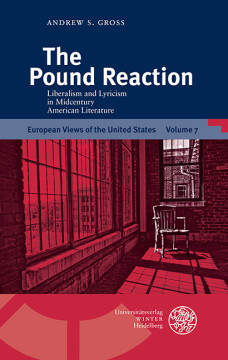
BUCH
The Pound Reaction
Liberalism and Lyricism in Midcentury American Literature
European Views of the United States, Bd. 7
2015
Zusätzliche Informationen
Bibliografische Daten
Abstract
Ezra Pound was confined in a mental institution and facing treason charges when he won the first Bollingen Prize in 1949. Pound’s defenders claimed that the Prize proved artistic freedom to be alive and well in the United States. Only totalitarian regimes forced artists to tow the party line. ‘The Pound Reaction’ explores how a number of writers responded to this free speech defense of Pound’s poetry. Those discussed include Bollingen committee member Karl Shapiro, who believed that his vote against Pound ruined his career; W. H. Auden, who voted for Pound but suggested his work should be suppressed; Peter Viereck, the poet and conservative thinker whose father was a convicted Nazi propagandist; John Berryman, who struggled with the legacy of Pound’s anti-Semitism throughout his career; and Katherine Anne Porter, who voted to honor Pound’s poetry but thought the poet should stand trial (he never did). Other writers discussed include Lowell, Bishop, Plath, Ginsberg, and Leslie Fiedler.
Inhaltsverzeichnis
| Zwischenüberschrift | Seite | Aktion | Preis |
|---|---|---|---|
| Cover | C | ||
| Title Page | iii | ||
| Copyright | iv | ||
| Table of Contents | vii | ||
| Preface | ix | ||
| List of Publications under the Auspices of the European Association for American Studies | xiii | ||
| Acknowledgments | xvii | ||
| Introduction | 1 | ||
| Chapter I, Lyrical Freedom and Institutional Confinement: Following in Pound’s Footsteps | 43 | ||
| Chapter II, Liberalism and Lyricism, or Karl Shapiro’s Elegy for Identity | 67 | ||
| Trial of a Poet | 69 | ||
| Individualism and Identity | 73 | ||
| Identity as Confession | 79 | ||
| Shapiro’s Elegy for Identity | 83 | ||
| Chapter III, Individualism, Auden’s Anxiety, and the Liberal Unconscious | 95 | ||
| An Age Takes a Name | 96 | ||
| Auden’s Anxiety | 104 | ||
| Pound beyond the Pale | 120 | ||
| Chapter IV, “When conservatism was still a dirty word …”: Modernism, New Conservatism, and Peter Viereck’s “Poetry of Ideas” | 127 | ||
| The Pound Reaction and the Liberal Aesthetic | 136 | ||
| Conservatism and Literature: Viereck contra Pound | 139 | ||
| Remembering Viereck: “When conservatism was still a dirty word | 154 | ||
| Forget Viereck | 163 | ||
| Chapter V, “Pull Down Vanity”: Porter, Fiedler, and the Pornographic Imagination (A Prosaic Interlude) | 165 | ||
| Porter: The Passionate Limits of Individualism | 173 | ||
| Love and Death at Midcentury | 189 | ||
| Chapter VI, Imaginary Jews and True Confessions: Ethnicity, Lyricism, and John Berryman’s. The Dream Songs | 201 | ||
| “The Imaginary Jew” and the Mirror of Anti-Semitism | 205 | ||
| Genocide, Poetry, and the Doctrine of Impersonality | 209 | ||
| The Dream Songs, Impersonation, and Palatable Monstrosity | 214 | ||
| Imaginary Jews, True Confessions, and Ethnicity | 219 | ||
| Epilogue | 227 | ||
| Bibliography | 233 | ||
| Index | 251 |


 Publishing Platform by CloudPublish
Publishing Platform by CloudPublish